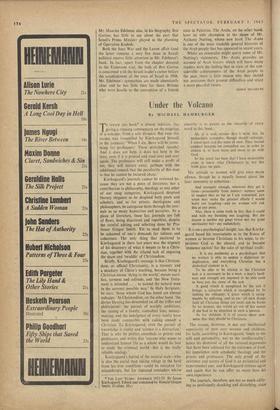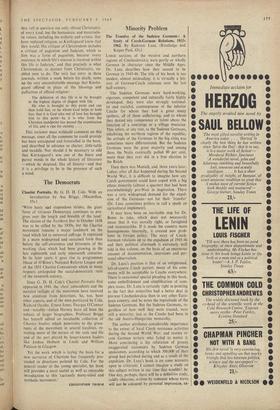Under the Volcano
By MICHAEL HAMBURGER
To review this book* is almost indecent, like giving a running commentary on the eruption of a volcano, from a safe distance. But even this excuse was forestalled by Kierkegaard himself
in the journals: 'When I die, there will be some- thing for professors! These wretched rascals! And it does not help, it does not help in the least, even if it is printed and read over and over again. The professors will still make a profit of me, they will lecture away, perhaps with the additional remark that the peculiarity of this man is that he cannot be lectured about.'
Kierkegaard's journals cannot be reviewed be- cause they are not a piece of literature, nor a contribution to philosophy, theology or any other of our snug categories. Kierkegaard despised literary elegance as he despised both poets and scholars, and as for priests, theologians and philosophers, he castigated them through the jour- nals as so many hypocrites and parasites. As a piece of literature, these last journals are full of flaws, being disjointed and repetitive, despite the careful editing and selecting done by Pro- fessor Gregor Smith. Yet to read them is to be ashamed of one's demands for tidiness and coherence. The only thing that mattered to Kierkegaard in these last years was the urgency of his discovery of what it means to be a Chris- tian, together with the related task of exposing the sham and 'twaddle' of Christendom.
Briefly, Kierkegaard's message is that Christen- dom, or official Christianity, is a travesty and a mockery of Christ's teaching, because being a Christian means 'dying to the world,' means sacri- fice, torment and solitude, and 'the New Testa- ment is intended . . . to wound the natural man in the severest possible way.' In Holy Scripture, he says, 'those whom God has loved are always unhappy.' In Christendom, on the other hand, 'the divine blessing has descended on all the trifles and philistinism'; the pursuit of worldly ambitions, the raising of a family, connubial love, money- making, and the indulgence of every vanity have been made compatible with calling oneself a Christian. To Kierkegaard, even the pursuit of knowledge is vanity and 'science is a distraction.' That is why he prefers cannibals to priests and professors, and writes that 'anyone who wants to understand human life as a whole would do best to study the criminal world—this is the really reliable analogy.'
Kierkegaard's hatred of the natural man—who is also the social man taking refuge in the herd from his true condition—could be mistaken for misanthropy, but for repeated reminders whose
* THE LAST YEARS: JOURNALS 1853-55. By Soren Kierkegaird. Edited and translatcd'by Ronald Gregor Smith. (Collins, 35s.)
sincerity is as patent as the sincerity of every word in this book :
Ah. it is with sorrow that I write this. In melancholy sympathy, though myself unhappy, I loved men and the mass of men. Their bestial conduct towards me compelled me. in order to endure it, to have more and more to do with God.
So the result has been that I have undeniably come to know what Christianity is; but this truth gives me pain.
His attitude to women will give even -more offence, though he is equally honest about his later immunity to seduction:
And strangely enough, wherever they get it from—presumably from instinct--women seem to suspect that so far as I am concerned, just when they make the greatest efforts I would burst out laughing—and no woman will risk this at any price.
Alas, there is some truth in this, that it could end with my bursting out laughing. But the reason is neither my great virtue nor my great spirituality but---my melancholy.
It is on a psychological insight, too, that Kierke- gaard based his reservations as to the fitness of women to become Christians in his sense, to ex- perience God as the absurd, and to become 'immense egoists' for the sake of spiritual truth: • . . It is my testimony as a psychologist that no woman is able to endure a dialectical re- duplication, and everything Christian has a dialectical element in it.
To be able to be related to the Christian task it is necessary to be a man. a man's hard- ness and strength are required to be able even to bear just the stress of the task.
A good which is recognised by the evil it brings; a salvation which is recognised by its making me unhappy; a grace which is recog- nisable by suffering, and so on—all such things (and all Christian things are such) can be borne by no woman, she would go out of her senses if she had to be stretched in such a tension.
As for children, it is of course sheer non- sense that they should be Christians.
The reason, however, is not any intellectual superiority of men over women and children, for faith, according to Kierkegaard, 'tends to the will and personality, not to the intellectuality'; hence his dismissal of all the rational arguments that have been adduced for the existence of God, his impatience with scholastic theology arid the priests and professors. The only proof of the existence and nature of God is an existential and experimental one; and Kierkegaard stresses again and again that he can offer no more than his own experience.
The journals, therefore, are not so much edify- ing as profoundly shocking and disturbing, since they call in question not only official Christianity of every kind, but the humanistic and materialis- tic values, including the aesthetic and artistic, that have replaced religion, as Kierkegaard knew that they would. His critique of Christendom includes a critique of paganism and Judaism, which to him was a form of paganism, because 'every existence in which life's tension is resolved within this life is Judaism,' and that precisely is what Christendom, as distinct from Christianity, en- abled men to do. The very last entry in these journals, written a week before his death, sums up the very uncomfortable message that Kierke- gaard offered in place of the blessings and palliatives of official religion; The definition of this life is to be brought to the highest degree of disgust with life.
He who is brought to this point and can
then hold fast, or he whom God helps to hold fast, that it is God who out of love has brought him to this point—he it is who from the Christian standpoint has passed the examination of life, and is ripe for eternity . . .
This reviewer must withhold comment on this message, since all the comment he could provide has been anticipated and forestalled in the book, and described in advance as chatter, tittle-tattle and twaddle. Nor should it be necessary to add that Kierkegaard's was one of the finest and purest minds in the whole history of literature —which he despised, like all history—and that it is a privilege to be in the presence of such a mind.



































 Previous page
Previous page